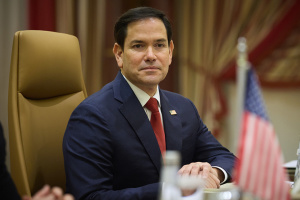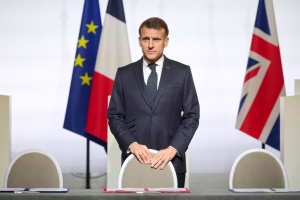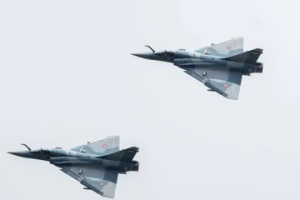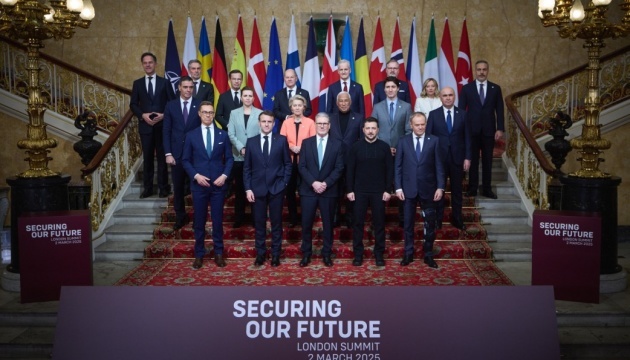
London Summit outcomes and how they benefit peace in Ukraine and European security
Strengthening defense capabilities and long-term commitments to Ukraine signal a major shift in strategic thinking in Europe
A major summit on the war in Ukraine took place in London this weekend, where 17 European leaders and Canadian premier Justin Trudeau discussed the next steps to peace for Ukraine. Leaders from Germany, Denmark, Italy, Netherlands, Norway, Poland, Spain, Canada, Finland, Sweden, the Czech Republic and Romania participated in the summit at central London's Lancaster House billed as "Securing Our Future". The Turkish foreign minister, NATO secretary-general and the presidents of the European Commission and European Council were also in attendance. All participants reaffirmed their commitment to supporting Ukraine.
British Prime Minister Keir Starmer has announced a £1.6 billion missile deal for Ukraine, supplementing the previously announced £2.2 billion loan. The deal will allow Ukraine to use £1.6bn of export finance to buy more than 5,000 air defense missiles, which will be made in Belfast. Sir Keir said Ukraine must be able to negotiate peace from a position of strength, and the advanced air defense missiles would enable that.
The deal will also create hundreds of jobs in Northern Ireland and hundreds more will be supported in the UK, through the manufacture of more than 5,000 lightweight-multirole missiles (LMM), which will treble production at Thales factory in Belfast.
The LMMs are intended to protect against Russian drone and missile attacks.
Sir Keir said: "This new support will help protect Ukraine against drone and missile attacks but it will also help deter further Russian aggression following any end to the fighting”.
Sir Keir furthermore said, that "This will be vital for protecting critical infrastructure now, and strengthen Ukraine in securing the peace when it comes, because we have to learn from the mistakes of the past."
British Prime Minister Keir told leaders at the meeting that they need to step up and continue to support Kyiv and meet a “once in a generation moment” for the security of Europe.
Despite Russia’s continued rhetoric of peace, their actions on the ground — specifically, their “relentless aggression” — make it clear that support for Ukraine must continue, said Sir Keir.
Starmer also stressed that the current moment represents “a once-in-a-generation moment for the security of Europe. The outcome of the conflict is not merely a matter of moral right or wrong, but a matter of vital importance for the security of all European nations, he said, adding, “Getting a good outcome for Ukraine is vital for the security of every nation here, and many others, too.”
Key takeaways from the summit
Europe is committing to large-scale rearmament, both for itself and for Ukraine. Several leaders emphasized the need for long-term military readiness, signaling a shift toward sustained defense investment.
New military aid packages for Ukraine are being announced and will continue to be rolled out. The strategy is clear—fortify Ukraine to strengthen its position in any future negotiations.
The UK is forming a coalition of nations willing to guarantee Ukraine’s security after a peace agreement. This includes potential troop deployments and aerial defense commitments. Starmer stressed that European security cannot be left to chance.
But that's not all.
President Emmanuel Macron of France suggested a partial month-long truce between Russia and Ukraine as the key to unlocking a lasting peace between the two sides. He proposed a four-week truce "in the air, at sea and on energy infrastructure". It would not cover ground fighting along the front line in the east.
"In the event of a ceasefire, it would be very difficult to verify [a truce] along the front was being respected," Macron said.
Under the French proposal, a European "assurance force" would deploy to Ukraine to deter future Russian aggression only after any lasting ceasefire had been agreed.
French Foreign Minister Jean-Noel Barrot commented: "Such a truce on air, sea and energy infrastructure would allow us to determine whether Russian President Vladimir Putin is acting in good faith when he commits to a truce. And that's when real peace negotiations could start."
Ukrinform requested experts to give their assessment of the summit’s outcomes and of the aforementioned “four-week-truce” initiative, in terms of how it would benefit Ukraine and if Moscow would accept it.
“Not only Europe is aware of the threats, but also begins to act, shoring up its own defense subjectivity”
Mykhailo Samus, CEO at the New Geopolitics Research Network platform, noted in a comment to Ukrinform that despite the fact that the summit in London was informal, consultative, that is, it was not supposed to adopt decisions, its importance is difficult to overestimate. EU leaders sent a signal they are ready to give more weight to their own defense initiatives and move toward greater strategic autonomy.
“This is also evidenced by the statement made by French President Emmanuel Macron, who after the meeting hinted at the possibility of deploying French nuclear weapons on the territory of other European countries. This suggests that France, allied with Great Britain, is gradually taking on the initiative to shape a European deterrence policy. It is expected that Germany will also join this process as soon as the domestic political processes of formulating a new government are completed,” the expert says.
We are currently seeing acceleration of the processes that looked almost unrealistic just a week ago. The meeting between Zelensky and Trump in Washington changed the political context, Mr. Samus believes.
“The US is seeking to put pressure on both Ukraine and Europe so that Kyiv is first to commit to a cessation of hostilities. I don’t know what this will look like in reality, but Trump has come up with something like that. And this new really is triggering processes in which Europe should take the lead. This is about the creation of collective defense capabilities, of collective forces to deter the Russian Federation, and the growth of the defense industrial capacities and capabilities,” Samus says, and continues, “Incidentally, against this background, a relevant question arises as to whether Europe should continue to purchase American F-35s and Patriot systems as a core of Europe’s future air defense shield, or rely on the weapons of own production? For example, deploy Eurofighter airplanes instead of F-35s as a stopgap measure while investing resources in the development of a new generation of unmanned aircraft. It is obvious that these decisions will all require major investments both in terms of finances and political will. However, for Ukraine, this turn of events is beneficial: Europe is not only aware of the threats, but also begins to act, strengthening its own defense subjectivity. Let's see how we collectively cope with this challenge”.
“Europe is preparing for greater autonomy, ceasing to rely solely on the USA”
Olexandr Kovalenko, defense and policy analyst at the Information Resistance group, believes that “a lot of statements were made at London, and now the main thing is to see concrete steps made.”
The London summit contrasts with what happened in Washington, primarily in the way European leaders received President Zelensky and expressed support for Ukraine. And this contrast is very important, especially in the current context.
“The Trump-Zelensky spat in the White House has come as a cold shower for Europe. In fact, conclusions should have been drawn back in 2023, when Republicans in the US Congress blocked aid to Ukraine for the first time. However, as folks say, better late than never. Now Europe is ceasing to rely solely on the USA. Strengthening defense industrial capabilities and increasing defense budgets is an important and, undoubtedly, the right step that Europe should have taken a long time ago,” Kovalenko said.
Regarding support for Ukraine, we can expect an increase in arms supplies, especially if the potential termination of security aid from the US becomes a reality.
“If this is the case, Europe’s engagement will be decisive for Ukraine. Of course, even without US support, a disaster will not happen, but the situation will be significantly complicated. That is why European support is critically important for us,” Kovalenko believes.
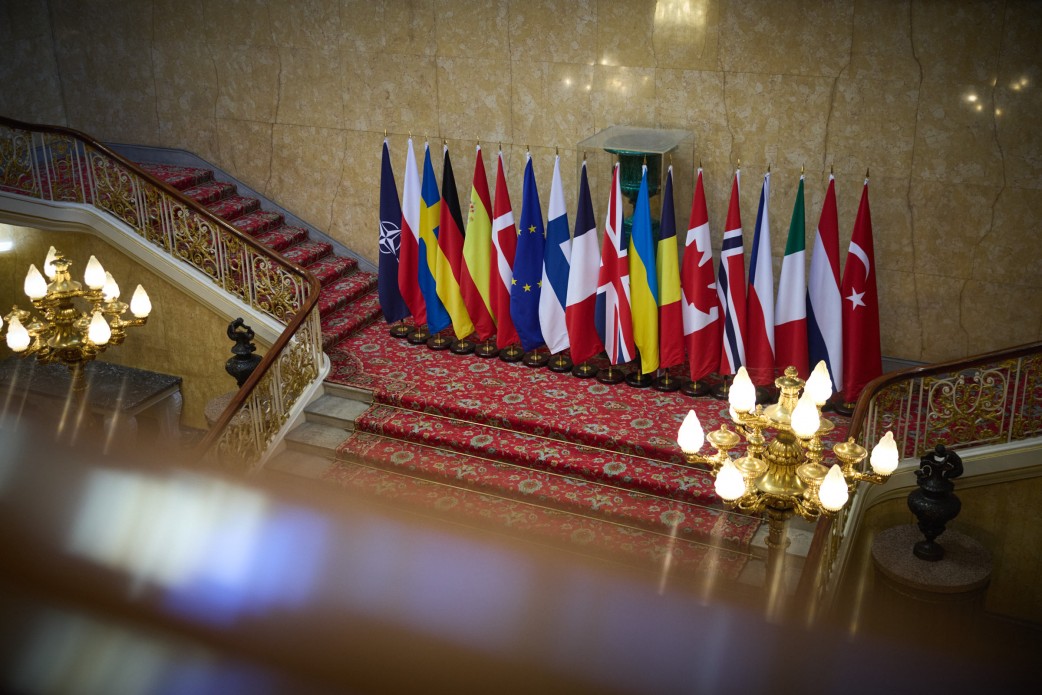
“Europe is finally moving towards an active role in the global security architecture”
Oleksandr Leonov, executive director of the Penta Center for Applied Policy Studies, says that the London summit has raised mixed feelings. On the one hand, Ukraine expected more specifics, not just general promises. For example, London’s commitment to transfer 5,000 air defense missiles sounds encouraging, but the deliveries will stretch until 2030. On the other hand, it is important that the British defense industrial sector would be working to support Ukraine in the long run.
“This is a positive signal. Great Britain is demonstrating sustainable support for Ukraine regardless of the political situation, which is a strategically important factor,” he says.
Another key point is the frank statements by European leaders, in particular Donald Tusk, on the need to strengthen Europe’s defense capabilities. The Polish leader emphasized that Europe is a serious military force and is capable of defending itself.
“This is an important emphasis, because the belief that Europe is defenseless without the US is false. Especially since the UK and France have nuclear weapons potential of their own, which, while inferior to the American one, remains a serious deterrent,” Leonov added.
That said, European leaders have urged President Zelensky to intensify contacts with Trump and resume negotiations on defense and security aid.
“This also indicates that Europe is not yet ready to fully compensate for the support provided by Washington. Some critically important elements – such as Patriot missiles or intelligence – remain irreplaceable,” the expert comments.
However, in his opinion, certain opportunities for the compensation still exist. Europe can turn to alternative suppliers, such as South Korea. Poland already has experience purchasing weapons from Seoul, and this approach can be scaled up to the EU level. However, the issue of air defense remains open: “A logical step would be to initiate the creation of a European missile program and immediately initiate the development of new air defense systems of their own. Not juts would this reduce dependence on the United States, it’s also a response to Trump.”
Europe is finally taking on an active role in the global security architecture. While previously major talks used to be held between the USA and Russia, with Ukraine and Europe being put before the fact, now the situation is changing.
“Now Trump will have to deal not only with Moscow, but also with Europe as an equal actor. This weakens the position of Russia, who can no longer count on agreements with Washington only. This also changes the approach to Russia sanctions policy. Even if the US decides to ease sanctions against the Russian Federation, this will not have a critical effect, since Europe remains the key market for the Russian economy. Before the war, 70 percent of Russia’s energy export revenues came precisely from sales to the EU, not China. So as long as Europe maintains a tough sanctions policy, economic pressure on Moscow will remain significant. This means that, today it is not only Washington and Moscow who determine the future security architecture, but Europe is evolving into a fully-fledged stakeholder in this process,” says the analyst.
Another important trend is the discussion on the possibility of creating a new pan-European defense alliance. NATO no longer looks like an absolutely reliable alliance. Article 5 remains vague, and individual members of the Alliance, such as Hungary, already showed off their pro-Russian position by blocking Sweden’s accession.
“Creating a local defense alliance would allow us to circumvent these problems and build a more effective structure. For example, the NATO Charter could provide for the possibility of expelling a country that violates the principles of European unity. This would allow us to respond more rapidly to emerging challenges without political delays. Anyway, the European Union is gradually transforming from a purely political and economic alliance into a military and political force,” Oleksandr Leonov believes.
"Starmer's announcement of a "coalition of the willing" is in fact a precursor establishing a new military-political alliance in Europe"
According to Oleh Posternak, a political scientist, this turn of events was unavoidable: "European countries have begun to shape their own security subjectivity under conditions of volatile US support and a high-intensity continental conflict ongoing between Ukraine and the Russian Federation."
“The London summit marked a starting point for shaping more intensive and responsible interaction between European countries regarding Ukraine”.
"Starmer's announcement of a "coalition of the willing," with the British-French cooperation on the potential deployment of European security forces on the Ukrainian soil at its core, can be a hallmark of a new military-political alliance in Europe. However, the issue of supplementing this security coalition with meaningful steps towards supporting Ukraine, not just financial and diplomatic, but also military, has yet to be resolved. Actually, the first news is encouraging: Britain is ready to secure the skies over Ukraine. That said, however, European countries are yet unable to fully replace American aid, as Europe does not yet have a strategic idea about how to act in the face of strained relations between Kyiv and Washington,” the expert says.
Even so, European countries understand that the United States’ geopolitical shift towards Russia requires greater security integration.
“Hence the idea suggested by French Prime Minister François Bayrou to set up a European defense alliance and a hinted suggestion by incoming German Chancellor Merz that Europe should be prepared to create its own defense alliance independent of the United States. President of the European Commission Ursula von der Leyen insists that Europe must urgently rearm. The idea of a collective European army also looks extremely promising. Because if and when the Russo-Ukrainian war ends, Moscow will immediately refocus on a hybrid war against the weak European Union without U.S. support,” Mr. Posternak maintains.
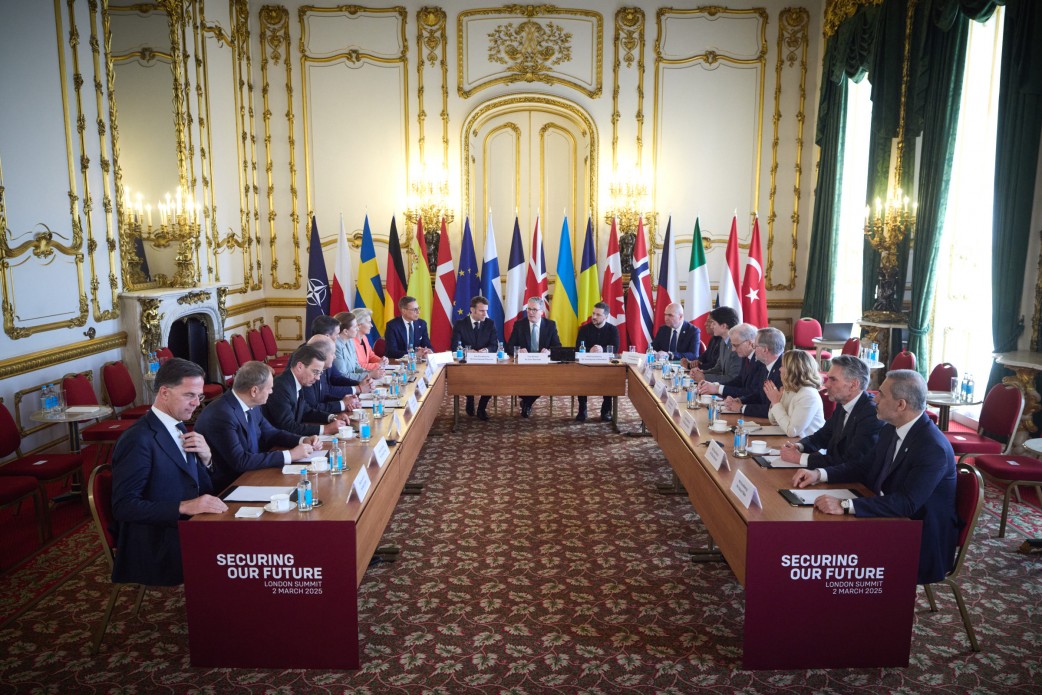
“Europe and Ukraine are in one boat. Europe’s security is integral to security of Ukraine and the other way round”
Oleh Saakian, co-founder of the National Platform for Resilience and Cohesion, summed up the London meeting with four points.
The first point is that the participants of the London Summit agreed to coordinate efforts to strengthen European security, in particular in terms of support for Ukraine.
“We witnessed the formalization of the ‘coalition of the determined’, which has long been talked about. This coalition has declared ready to be a subject in international politics both towards the East and towards the West, that is, towards Trump. Historians will probably call this summit the moment when the foundation of European security subjectivity was laid,” says Mr. Saakian.
Second, the summit actually committed to creating a “collective European military force” and, hypothetically, a “European General Staff.” According to the political scientist, Europe's defense policy could be coordinated by various entities:
- The European Union - through funds and programs that will boost defense industrial capabilities growth, reducing dependence on critical production chains outside the EU.
- NATO - as a nuclear umbrella and a platform for synchronizing military standards, training and intelligence exchange.
"But so far there is no "General Staff of Europe" in place that would coordinate defense initiatives, rapidly respond to threats and act in those areas where the EU and NATO are overburdened or limited by consensus decisions. The summit in London showed that the formation of such an entity is becoming an increasingly urgent necessity," the expert added.
Third, Europe is for the first time demonstrating the ambition to formulate its own agenda in negotiations with the Russian Federation, going beyond the traditional scenario, where the main role was assigned to the United States.
“The suggested plan for a short-term ceasefire and security guarantees indicates an attempt to create, jointly with Ukraine, a negotiating platform of its own, which gives it legitimacy. Then this format can be offered to Trump’s administration and, through it, to Russia,” says Oleh Saakian.
Fourth and finally, the main result of this summit was a clear confirmation: Europe and Ukraine are in one boat.
“Europe’s security is integral to security of Ukraine and the other way around. This principle is reflected in the draft resolution of the upcoming EU summit, scheduled for March 6, with the ongoing Russia-Ukraine war as the central topic”.
30-day truce: what the Franco-British initiative is about
Oleh Posternak comments: this idea is based on the concept of a gradual “cooling off” of the war and is a classic tool for ending long-running hot wars: “The idea is to get the war gradually “slow down” to an end. This is roughly how Israel's anti-terrorist war against Hamas ended, when the ceasefire included a series of successive stages. A positive experience with a ceasefire at the first stage automatically increases the likelihood of achieving it at the next one.”
But in the context of the Ukrainian-Russian war, it looks more like a theory, since there are no guarantees that the Russian Federation will honor it.
“A very telling example is Black Sea grain corridor deal, from which the Russian Federation eventually withdrew unilaterally, or ceasefire violations during the first stage of the war in 2014-2022. It is unlikely that Putin is willing to agree to a EU-sponsored ceasefire at a time of grand victory looming on the horizon and more favorable conditions evolving on the American front.”
Oleksandr Kovalenko agrees: “I don’t think Russia would accept this. Moscow is interested in terrorizing Ukraine with drone strikes on a daily basis. An important element to that strategy is exhausting Ukraine’s air defense capacities. Even despite the fact that just an average three percent of the drones launched reach their targets, it is still a cheap and pretty effective means of terrorizing far from the frontline regions in Ukraine compared to the use of cruise missiles and other means of destruction. They will not stop it.”
According to Oleh Saakian, the proposed 30-day ceasefire in the air, at sea and in the energy sector is part of a broader plan to end the hot phase of the war. It provides for security guarantees and mechanisms that would preclude the Russian Federation from resuming hostilities. This is a kind of test of real intentions pursued by both sides: for Trump, it is a test of his readiness to pressurize Putin into peace, and for Putin, it is a test of his sincerity to end the war.
“This ceasefire is beneficial for Ukraine, since it does not affect the ground component, and therefore does not give Russia the opportunity to avail of it to regroup and reorganize its forces. For Ukraine, a 30-day pause in strikes on targets inside Russia is not critical, since these strikes are strategically aimed to deplete the enemy’s war waging capacity in the long-run. At the same time, Russian drone and missile strikes on Ukrainian civilian infrastructures are more in the nature of terrorist attacks as an element of a policy of immediate pressure. "The potential truce, if achieved, is therefore going to be more beneficial for Ukraine than for Russia. Europe thereby presents Trump with a choice: he either distances himself from Putin and builds a partnership with Europe, or reveals his reluctance and a lack of will to put the screws on the Kremlin."
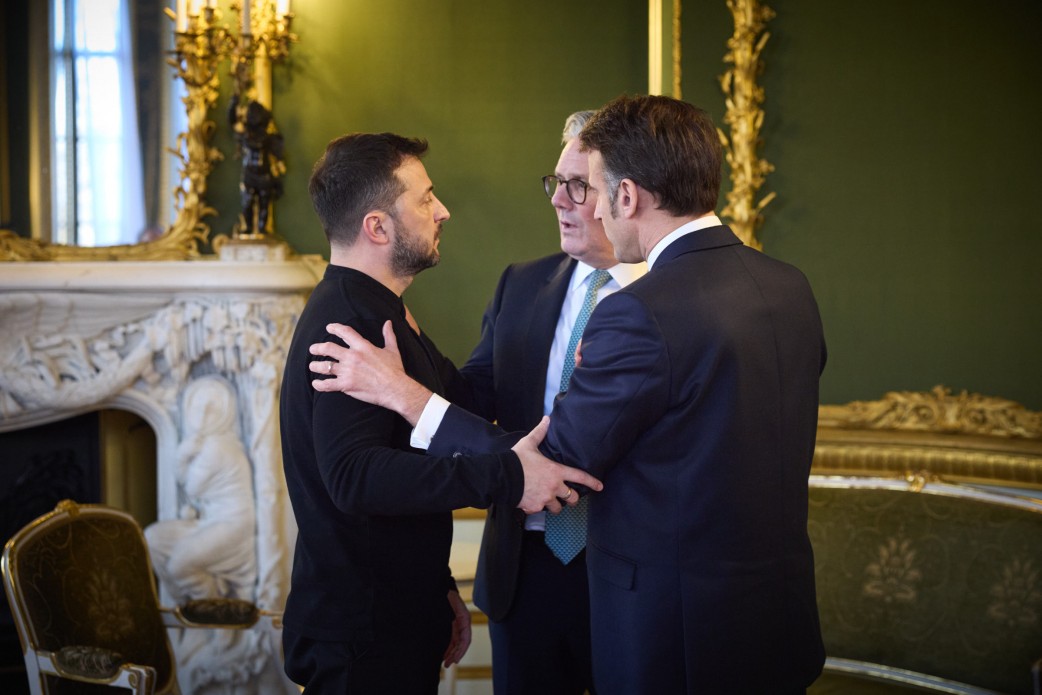
Ukrainian President Volodymyr Zelensky, British Prime Minister Keir Starmer, French President Emmanuel Macron
Oleksandr Leonov highlights two key aspects. First, this approach may cause some dissatisfaction in Ukraine, because it creates the impression that Europe has shown solidarity with Trump on the issue of sequence: first a ceasefire, followed by security guarantees. However, there is also a fundamental difference from the American vision.
“The European plan has become more specific and logical: first of all, a ceasefire in the sky, at sea and in the energy sector. This allows us to clearly verify and control the situation. The next step is to introduce peacekeepers into Ukraine even pending the start of peace negotiations. And this is a key technical aspect,” he says.
The European approach includes a mechanism of control and monitoring. If two warring parties declare a ceasefire, there must be a third party to monitor and verify compliance, and determine the algorithm of actions in case of violations.
“It is this critical element that is missing from the American vision, which makes the potential truce deal immature and hard to implement”.
Asked whether this plan suits Ukraine, Leonov answered a counter-question: will the Ukrainian air defenses be able to withstand persisting pressure from Russia?
“Moscow is purposefully aiming to overwhelm our air defenses, attacking with hundreds of kamikaze drones every day. And here another problem arises: lacking sufficient supplies of Patriot missile interceptors and other air defenses, Ukraine risks becoming defenseless against both drone and ballistic missiles that are currently effectively defeated by Patriot missiles. This creates a critical threat to our energy sector, industrial facilities, and civilian infrastructures. In this context, the question may arise about a potential exchange: should Ukraine stop strikes on Russian territory in exchange for security guarantees and bolstering its air defenses? Such a scenario could be put on the table, but only in the event that partners are committed to providing Ukraine with adequate means of defense and meaningful guarantees that Russia would honor the truce. This is a matter to be negotiated between the Washington and Moscow. Trump has repeatedly stated that Moscow is supposedly ready for peace…”
Mykhailo Samus comments: “This should be a comprehensive solution that is applicable not just to air, sea and energy strikes, but also the entire front line. And it is important to clarify the details: are we talking about missiles only, or about drones, too? And what about aviation? Is artillery taken into account? Trump accuses Zelensky of not wanting peace. In response, Macron and Starmer could state: “We talked with Zelensky, and he agrees to a ceasefire. But this must be a comprehensive ceasefire encompassing the Front Line all along its length and depth, all the weapons, and it should last for a clearly defined period of one month.” “This creates a situation in which Trump, as the main communicator with Putin, gets the ball rolling. He keeps saying that Putin is ready for peace – okay, now he is faced with a concrete proposal: “France and the UK are offering a month-long ceasefire with no additional conditions attached. Is Putin ready?”
If Trump really has influence over Putin, he can check it right now. And then we can talk about extending the ceasefire and even creating an international monitoring mission involving the participation of European partners.
Myroslav Liskovych. Kyiv

